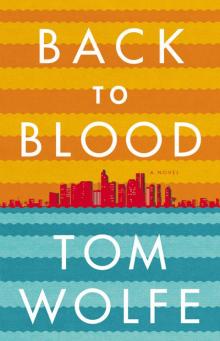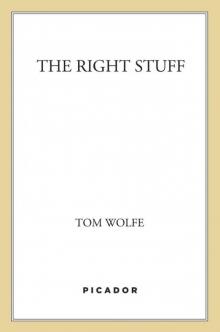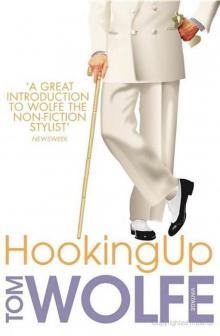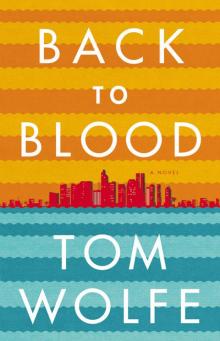The Purple Decades - a Reader Read online
Page 10
“Hai-ai-ai-ai-ai-ai-ai-ai-ai-ai-ai-ai-ai-ai-reeeeeeeee!”
All of a sudden old Harry is waving away from down there on Greenwich Avenue, out front of the Casual-Aire shop and yelling back: “Hey! who is it?”
“Hey, Harry!” the girl yells.
“Hey, Harry!” another girl yells.
“Hey, Harry!” still another girl yells.
Four girls, five girls, six girls yell, “Hey, Harry!”
Then one of them yells, “Hai-ai-ai-ai-ai-ai-ai-ai-aireeeee! Have you got a——————for me?”
Then another one yells, “Hey, Harry, come on up and————————————!”
Harry looks like a poleaxed lamb in that wobbly moment just before the cerebral cortex shuts off for good. Old Harry has been searching all right, and he has had some lubricous thoughts about what would happen after his and Dream Girl’s eyes and mind met, but this laying it on the line like that, right out in the middle of Nut Heaven—it was too gamey or something.
So Harry walks away, west on Greenwich Avenue, with the cellblock horselaughs following him, and by now, of course, he knows he has been had.
So the girls take up new names to see if anybody will bite:
“John-n-n-n-n-n-n-ny!”
“Hey, Bil-l-l-l-l-l-l!”
“Frankie!”
“Hi, Honey!”
“Sammy!”
“Max!”
For some reason, a name like Max breaks everybody up, and all the girls start the cellblock horselaugh even before they find out if there is anybody down there named Max who is going to look up with the old yearning gawk.
The girls, these Sirens, these Voices, are all up in the cellblocks of the Women’s House of Detention, 10 Greenwich Avenue, overlooking Village Square, and, well, what the———, as the girls like to say, these yelling games are something to do. The percentages are in their favor. There are thousands of kids trooping through the intersection all the time, and eventually a girl is going to get somebody named Harry, Johnny, Bill, Frankie, Sammy or, affectionately, Honey.
The Women’s House of Detention is, no doubt, a “hellhole,” as even the Corrections Department people speak of it every time they ask for an appropriation to build a bigger one. It is a mess: 600 women in a space meant for 400. Teen-age girls, first offenders, some of them merely awaiting trial, are heaped in with “institutionalized” old puggies who feel like bigger shots inside than out. The place is filthy. It is so bad that a convicted prostitute, narcotics user and peddler, Kim Parker, combining, at age 35, the sins that land 80 per cent of the girls inside 10 Greenwich Avenue, pleaded guilty to a felony rather than a misdemeanor last October. The felony sentence might be five years at the state prison farm, which to her was a happier prospect than one year in the Women’s House of Detention.
Yet there is probably not another large prison in the country that is in such intimate contact with the outside world. The building, twelve stories high, was built in 1932 as a monument to Modern Penology. The idea was to make it look not like a jail at all but like a new apartment building. There are copper facings with 1930’s modern arch designs on them between the floors. In the place of bars there are windows with a heavy grillwork holding minute square panes. The panes are clouded, like cataracts. Actually, the effect is more like that of the power plant at Yale University, which was designed to resemble a Gothic cathedral, but, in any case, it does not look like a jail.
So here is a jail that looks like a Yale power plant with cataracts standing out in the middle of a community that has become a paradise for kids in New York, Greenwich Village. The girls in the House of Detention can stand up on the toilet bowl or something and look out the couple of hinged window panes they have out onto all that Life among the free kids. Right down there, off the intersection, are all the signs, Trude Heller’s, the twist and bossa nova place, Burger Village, Hamburger Train, Luigi’s, Lamanna Liquors, Foam Rubber City, the Captain’s Table, Nedick’s and the swingingest Rexall drug store in New York City. Skipping across Sixth Avenue and screaming every time the lights change are all the bouffant bohemians, with bouffants up top and stretch pants and elf shoes down below, and live guys in Slim Jims and Desert boots, and aging bohemians in Avenger boots and matching plaid poncho and slacks sets, and Modern Churchmen, painted lulus, A-trainers and twenty-eight-year-old winos who say, “All right, you don’t have a quarter, but if you had a quarter would you give it to me?”
Also junkies. The same night they conned Harry—“Hey! Who is it?”—the girls could see a kid known as Fester stumbling out of the Rexall wringing one hand and holding his stomach with the other. For a while Fester had folded his sweater up into a square and knelt down in the entrance to the Rexall with his head on the sweater, moaning. Everybody just stepped around him. But then Fester jumped up and ran to the cigarette counter and with a stifled shriek clouted a total stranger in the back of the neck with his open palm. The guy just wheeled around, still holding onto his Marlboros, shocked, and Fester started wringing his hand, saying in his elfy voice, “My hand stings!” and then stumbled out, holding his gut with the other. Fester is a junky; a lot of the girls know him. There was a time when a girl could hoist a fix up into the House of Detention on a “fishing line” with the help of a guy like Fester.
Well, Fester is in bad shape, but there he is, at least, out there on the loose in Greenwich Village, where everybody goes skipping and screaming across Sixth Avenue. The girls have to yell to all that life down there. The girls in one cellblock will all start yelling down there until the girl who is the lookout gives the warning signal, sometimes “Dum-da-dum-dum” from the old Jack Webb TV show, meaning that the turnkeys are coming. The girls will even yell to somebody they have just been talking to in the visitors room on the first floor on visiting night. It is one thing to talk to somebody inside the jail. It is a better thing to know you can still talk to them when they are back out there on the street in the middle of things.
“Willie!”
It is not long after Harry has disappeared west on Greenwich Avenue, and Willie has just come out of the front door at 10 Greenwich Avenue after visiting a girl whose name one never learns. One only hears her shrieking across Greenwich Avenue from somewhere up there in the great cataracted building.
“Willie! Are you gonna sell the pants!”
There are trucks bouncing along Greenwich Avenue and Sixth Avenue and cutting across into Greenwich from Ninth Street, but she can make herself heard. Willie, on the other hand, is the last of the great shoe buyers. He has on a pair of tan triple-A’s that won’t quit. He is not ready for yelling across Greenwich Avenue up at the Women’s House of Detention. He gives a look at all the people walking his way past Tucker’s Cut Rate Florist, Hamburger Train and the Village Bake Shop.
“Are you, Willie!”
Willie tries. “I don’t know where they are, I told yuh!”
“What!”
Willie puts a little lung into it this time. “I told yuh! I don’t know where they are!”
“You know where they are, Willie! You gonna sell ’em or not?”
Willie wants to get out of there. He doesn’t want to be yelling across Greenwich Avenue to some unseen gal in the Women’s House of Detention about selling a pair of pants. So he gives the first guy who comes by a weak, smiley, conspiratorial look, as if to say, Women! But the guy just stares at him and walks slow, so he can hear more. This makes Willie mad, and so he gives the next few people the death ray look—What you looking at!—which starts his adrenaline flowing, which in turn puts him in fuller, better voice.
“Aw, I don’t know where the pants are! What you bother with the pants for!”
“You gonna sell ’em, Willie!”
“All right!”
“‘All right!’” she yells it very sarcastically. “All right, Willie, all right, you do what you want!”
“Aw, come on, honey!”
Willie wishes he hadn’t yelled that. Now it seems lik
e about a thousand nuts are scuttling through Nut Heaven laughing at him and sidling looks at him standing in his tan triple-A’s yelling at a blank building.
“Naw, you do me like you did Maureen! Go on!”
“Listen—”
“Naw, you so fine, Willie!”
There is a lot of laughing from the cellblocks after that. Willie wants to vanish. All these damned faces around here gawking at him.
“All right!” Willie yells.
“You mean it!” she yells from somewhere up there. “You gonna sell the pants!”
“I told yuh!” Willie yells, right over the garbage trucks, the Vespas, the Volkswagens, the people, over the whole lumbering, flatulent mess.
“And then you coming back!”
“All right!”
“When!”
“Soon’s I sell ’em!”
“They in the closet, Willie!”
“All right!” Willie yells, and then he turns and walks fast down Christopher Street.
“Willie!” she yells. “Goodbye!”
There is a kid down there wearing a big black Borsalino hat and a George Raft-style 1930’s double-breasted black overcoat who has got to find out what it is all about. He runs after Willie and just asks him, straight out, and Willie blows up and suggests by means of a homey colloquialism how he can dispose of the whole subject, and selling the pants remains a private affair.
And inside the Women’s House of Detention, the girls are gathering spirit. It is eventide in a holiday season. On the Sixth Avenue side, about four girls begin the old song, and then, gradually, more join in:
I’m dreaming of a white Christmas!
Just like the ones I used to know!
Where the treetops glisten!
And children listen!
To hear sleigh bells in the snow …
How touching are these words as they drift over Sixth Avenue from the cataracts of the Women’s House of Detention! Villagers, laden with bundles, stop over there in front of the Kaiser clothing store and look up and listen, silently.
… with every Christmas card I write!
By now maybe twenty or thirty people have stopped on the avenue in a bunch, and they all have their heads cocked, rheumy eyes turned up in the attitude that says, I am already deeply moved and ready for more.
… may your days be mer-reeee and bright! …
How the sound rises! Every girl on the east side of the Women’s House of Detention, it seems like, has joined in and taken a gulletful of air for the final line, which comes out:
… And may all your Christ-mases be bla-a-a-a-a-a-a-a-ack!
Only some of the girls don’t even say black, they use adjectives such as——,———,———and———. Others have already given themselves up wholly to cellblock horselaughs, and soon they all have, and now the horselaughs come shrieking out across old Sixth Avenue to where all the obedient epopts of old-sampler sentiment are bunched in front of Kaiser’s. That was a good hit! Twenty or thirty of them, free squares of New York, bunched together and all conned! gulled! faked out! put on! had! by The Voices of Village Square.
Off to a Better Place
(“Ah, my dear, perhaps it’s just as well. Your decorator called today. The David Hicks carpet won’t be in for another six weeks, they dented the girandoles in shipping, he doesn’t know what happened to the Hartman lamps, and the couch arrived but the pillows are filled with polyurethane chips instead of goose down.”)
PURVEYOR OF THE PUBLIC LIFE
d
Up there in the office at Broadway and 52nd Street during the last days of Confidential, the old Confidential (1952—58), the most scandalous scandal magazine in the history of the world, everybody seemed to be ricocheting around amid the dolly lights and cracking up. Everybody, save one, namely, Robert Harrison himself, the publisher. Jay Breen’s liver had gone into its last necrotic, cirrhotic foliation. Jay Breen used to write half the magazine, but it had gotten to the point where Breen couldn’t stand to listen to the Reader anymore. Breen and his wife would come in and sit in the next room while the Reader read the stories for the next issue out loud. The Reader, whatever his name was, had a truly great voice, like Sir Ralph Richardson reading Lear soliloquies at a Bauhaus Modern lectern under a spotlight. Great diction, great resonance, etc. Harrison hired him just to read out loud. Harrison had a theory that if you read the stories out loud, every weak spot in a story would stand out. So there would be the Reader with a voice like Sir Ralph Richardson enunciating such works as “Errol Flynn and His Two-Way Mirror,” “White Women Broke Up My Marriage” [to a Negro entertainer], and “How Mike Todd Made a Chump of a Movie Mogul.” One of the writers would be in there muttering away because he claimed that the Reader had it in for him and was blundering over his best-turned phrases on purpose, thereby causing Harrison to throw whole stories out. But Jay Breen was long, long past all that, and presently he died, of cirrhosis of the liver. Meanwhile, Howard Rushmore, the editor, was beginning to look awful. He used to be such a big robust guy, and now he looked like a couple of eye sockets mounted on a piece of modern solder sculpture. Rushmore was an ex-Communist and a complex person. He had a talent for gossip stories, but somehow it was all wrapped up with the anti-Communist crusade he was carrying on. There came a day when Rushmore and his wife were riding in a cab on the upper East Side and he took out a revolver and shot her to death and then shot himself to death. Harrison was the publisher of Confidential and he remembered that day very well. He had just come into Idlewild Airport from someplace and gotten into a cab. The first he heard about Rushmore was when the cabdriver said, “Hey, did you hear that? The publisher of Confidential just shot himself!”
“The publisher of Confidential,” says Harrison, the publisher of Confidential. “Where did the publisher of Confidential shoot himself?”
“In the head, in a cab,” says the cabdriver. “He shot himself through the head, right in the back of a cab!”
Harrison remembers that, well, here he was, right in the back of a cab, and he didn’t have the slightest inclination to pull a gun on anybody inside or outside a cab. It had been wild for a while, forty million dollars’ worth of libel suits, the whole movie industry had been after him, jukebox gangsters or somebody like that had hung him upside down by his heels out his office window, Congressmen and half the newspapers in the country were crucifying him, some guy from Chicago was going to fly in and break every bone in his body, starting with his fingers and toes—but that was all pressure from outside. Inside, he wasn’t drowning in his own turbulent juices like Breen or Rushmore. He was serene, and Confidential was beautiful. This may be a hard idea to put across—the way Harrison found Confidential beautiful. But the fact is, the man is an aesthete, the original aesthete du schlock.
At the outset all I knew about Harrison was that he was living under an assumed name in a place called the Hotel Madison. To imagine the kind of picture that brought to mind, all you have to think of was the libel suits, the outrage, all the big people who were after him in 1957 when he sold Confidential and dropped from view. They must have crushed him like a Phrygian sacrifice. So the picture I had of Robert Harrison, the ex-publisher of Confidential, in someplace called the Hotel Madison was of a skulking fifty-nine-year-old man holed up in a hotel room where the view was a close-up of the air-conditioning duct of the short-order restaurant out back, hung with heavy-duty New York lint in clots like Spanish moss. That was until I saw the Madison, Reggie, Lately Miss BMC of Canada, and Harrison’s cravat.
The Madison, on East 58th Street, between Fifth and Madison, turned out to be a fairly posh and conservative old place full of big cooperative apartments and a lobby with plum and umber walls and servitors in white dickies. Harrison’s sister, Helen, a polite, quiet woman with grey-blonde hair who has been his personal secretary all these years, opened the door, and there was what I later learned was the very same apartment he had lived in during the heyday of Confidential. It has a thirty-foot living room all
buttressed with yards of faceted mirrors, a bar with Hilarious novelties on it, a pygmy tropical tree with a wooden ape hanging in the branches, ochre-colored neo-Moloch art objects, black and tan furniture, the total effect being the decorator style known as Malay Peninsula Modern. Pretty soon, out of one of the two side rooms, came Harrison, trampling through the wall-to-wall and tying the cravat.
“Have you had breakfast yet?” he says. It was one in the afternoon. “I’ve been on this goddamned diet. Let’s go to Lindy’s, I can’t stand it anymore. I lost two pounds. I got to have something to eat, some of that fish or something; you know, lox.”
Judging from his 1957 pictures, Harrison, now fifty-nine and grey-haired, may have a little more heft in the bags above and below the eyes, and a little more erosion in the jowls, but he is wearing his hair combed back long and on the rakish side, like Jon Hall in The Hurricane, and he has this silk cravat debouching like mad from the throat of his sports shirt. Furthermore, he still has a Broadway promoter’s accent, the kind that seems to be created by hidden pistons, and one of those voices that come from back in the throat as if it has been Mello-cured like a Dr. Grabow pipe.
And then, from exactly where I forget, materializes Reggie, a blonde. Reggie is one of these girls who strike you as more of an ensemble, a chorus, a tableau, an opulent colonial animal, than as one person. She has great blonde bouffant hair, a coat of white fur whose locks fluff out wider than she is tall, and a dog, a toy greyhound named Tessie. Reggie and Helen get into a discussion about the dog’s recent alimentary history to see if it will be safe to leave it in the apartment with Helen while Reggie, Harrison and I go off to Lindy’s. The dog looks just like a racing greyhound except that it is two feet long and wears a town coat.

 Back to Blood
Back to Blood The Painted Word
The Painted Word The Right Stuff
The Right Stuff Hooking Up
Hooking Up The Kingdom of Speech
The Kingdom of Speech The Bonfire of the Vanities
The Bonfire of the Vanities The Electric Kool-Aid Acid Test
The Electric Kool-Aid Acid Test The Kandy-Kolored Tangerine-Flake Streamline Baby
The Kandy-Kolored Tangerine-Flake Streamline Baby The Purple Decades - a Reader
The Purple Decades - a Reader Back to Blood: A Novel
Back to Blood: A Novel The Purple Decades
The Purple Decades